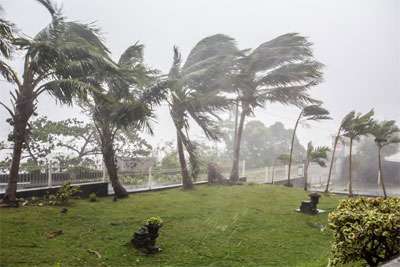 In a word, yes, if they are close to you. Weather of all types can make allergies worse, and hurricanes are no exception. Wind, rain, and humidity can kick up pollen and keep them swirling through the air. When you consider the terrific winds and low barometric pressure that make up a hurricane, they certainly are a “perfect storm” that can trigger bad allergies.
In a word, yes, if they are close to you. Weather of all types can make allergies worse, and hurricanes are no exception. Wind, rain, and humidity can kick up pollen and keep them swirling through the air. When you consider the terrific winds and low barometric pressure that make up a hurricane, they certainly are a “perfect storm” that can trigger bad allergies.
Sudden changes in temperature and humidity can aggravate all sorts of allergies, as well. Even conditions that like to act like allergies, but actually are something completely different will raise their ugly head when the weather changes. Non-allergic rhinitis is just such a condition. It’s irritating and carries all the typical symptoms of runny nose, congestion and post nasal drip, however, it will test negative for specific allergies. The American Academy of Allergy, Asthma and Immunology (AAAAI) provides a simple guide to understand the difference between the two:
- Seasonal allergic rhinitis, “hay fever”, is typically caused by outdoor allergens like pollen. Year round allergies can be caused by things like pets and dust mites.
- However, some people with allergic rhinitis symptoms don’t suffer from allergies. The symptoms may be similar, but the causes are different. That condition is called non-allergic rhinitis and it can
be caused by changes in weather, as well as strong odors, pollution, smoke, medications and chronic health conditions.
The only way to figure out which is causing your allergy symptoms is to consult an ear, nose, and throat specialist who can untangle the signs and symptoms. Once a diagnosis is reached, a treatment plan can provide relief.
Of course, some allergy sufferers would say the best answer is to control the weather! Short of that, there is a way to reduce the havoc that it wreaks on your allergies. Most of us close the windows so the wind won’t blow pollen into the house and clean pollen off the car, but there are some other tips to consider as well:
- Don’t rake the leaves. It just stirs up dust and allergens.
- Wear a mask when you mow the lawn. You may think you are allergic to the grass but in many cases you are allergic to the pollen in the grass or the mold growing in damp areas.
- Don’t bring fall leaves inside. They are beautiful but they will bring the allergens directly into your home.
- Don’t make the bed too quickly. (Finally, an excuse!) Indoor allergens like dust mites love your warm bed. Let the sheets air out in the natural sunlight because moisture keeps dust mites alive.
- Check if the products you buy for your bedroom are hypo-allergenic- pillows, mattress covers, cleaning products and even candles.
- Track the weather. Weather.com allows you to track storms and allergies. No one can predict how bad your allergy symptoms may be on any given day, but it will give you an idea of the convergence of weather-driven factors like wind and rain that may make your allergies worse.
Even with your best efforts, during your worst allergy season you are probably going to need medications to feel better. Nasal sprays and pills like Flonase, Nasonex, Allegra, and Claritin are considered front line treatments in the battle against allergies. Immunotherapy, including allergy shots or sublingual drops, provide relief for many patients. If feel you have tried everything, including nasal surgery, and still suffer from stuffy nose, post nasal drip or a runny nose there is still hope for relief. Advanced, minimally invasive treatments conducted in the physician’s office are safe and very effective in treating chronic allergies. We don’t usually toot our own horn, but it’s important for chronic allergy suffers to know that our own Dr. Berger, a Board Certified Otolaryngologist, was one of the first physicians in the Delaware Valley to conduct Endoscopic Sinus Surgery, and it offers a long-lasting and gentle cure for chronic sinusitis.
If you suffer from allergies you are not alone. The AAAAI says that more than 17 million adults and 7 million children suffer from them. When your triggers are identified, sinuses examined, and a treatment plan designed specifically for you, you can find relief.
We can’t prevent hurricanes from blowing up the East Coast, but we can prevent how they make you feel. At Berger Henry ENT Specialty Group, our board certified Ear, Nose and Throat specialists are here to diagnose and treat your allergy symptoms in every season of the year.
